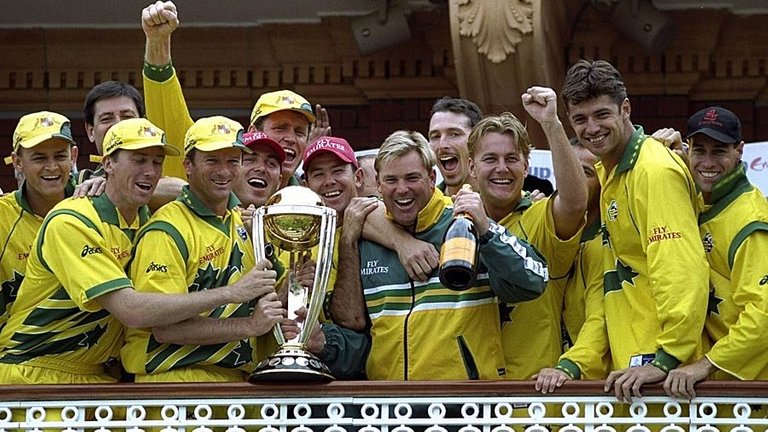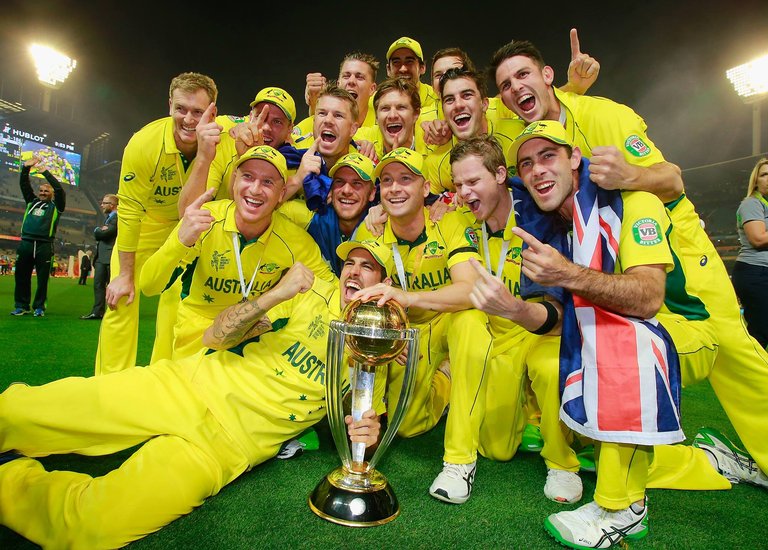The Australian cricket team is the most successful team in the Cricket World Cup winning the 1987, 1999, 2003, 2007 and 2015 editions. This also makes them the only team to have won the world cup in all the regions (group of countries) that have hosted the world cup till now.
1987 Cricket World Cup
The competition was won, for the first time, by Australia who defeated their arch-rivals England by seven runs in the most closely fought World Cup final to date in Kolkata's Eden Gardens stadium.
Australia won the toss and chose to bat. David Boon (75 from 125 balls, 7 fours) top-scored for Australia, whose batsmen scored fluently. Australia posted 253 (5 wickets, 50 overs). Mike Veletta (45 from 31 balls, 6 fours) cut loose late in the innings, as Australia scored 65 runs from the last 6 overs of their innings. In the English reply, opener Tim Robinson was out LBW for a first ball duck. Bill Athey (58 from 103 balls, 2 fours) top-scored, and England were almost on target, when captain Mike Gatting (41 from 45 balls, 3 fours, 1 six) handed back the initiative with the loss of his wicket, which ended a growing partnership of 69 runs in 13 overs between him and Athey. Allan Lamb (45 from 55 balls, 4 fours) also posted a great innings, but it was in vain as the required run-rate for England began to rise. When England failed to score the last 17 runs from the final over, the cup went to Australia.
1999 Cricket World Cup
The final of the 1999 ICC Cricket World Cup was played at Lord's, London on 20 June 1999. This was the fourth time Lord's had hosted the final of an ICC Cricket World Cup, previously hosting finals in 1975, 1979 and 1983. Australia won their second title by defeating Pakistan by 8 wickets in the final. Shane Warne was declared Man of the Match.

2003 Cricket World Cup
The 2003 Cricket World Cup Final was a One Day International (ODI) match played between Australia and India on 23 March 2003 at the Wanderers Stadium in Johannesburg, South Africa.
Both teams had progressed through three stages to reach the final. Australia was unbeaten thus far, while India had lost one game—against Australia in the first stage. Australia—led by Ricky Ponting—entered the game as firm favourites. After winning the toss, India captain Sourav Ganguly decided to field first before a crowd of nearly 32,000. The Australian opening pair, Adam Gilchrist and Matthew Hayden, added 105 runs in 14 overs. After their dismissals, Ponting (140 not out) and Damien Martyn (88 not out) were involved in a partnership of 234 runs, then an Australian record, and took the total to 359 runs at the end of the innings. Harbhajan Singh took both of the Australian wickets, conceding 49 runs.
In response, India lost their key batsman, Sachin Tendulkar, at the start of the innings. Despite a brief interruption by rain after the 17th over, no time was lost from the game. Once play resumed, India lost wickets at regular intervals. Virender Sehwag top-scored for India with 82 runs, before the team were bowled out for 234 runs in the 40th over. For Australia, Glenn McGrath took three wickets for 52 runs, while Brett Lee and Andrew Symonds claimed two wickets each. Ponting was named man of the match for his 140, and Tendulkar, the tournament's leading run-scorer (673 runs), was awarded the man of the series. The final was Australia's seventeenth successive ODI win, a record, and they were the first team to win three World Cups. Ganguly's decision to bowl first in the match was criticised by journalists and former cricketers.
2007 Cricket World Cup Final
The final of the 2007 ICC Cricket World Cup was played on 28 April 2007 at the Kensington Oval, Barbados. Australia defeated Sri Lanka by 53 runs (under the Duckworth–Lewis method) to win their 4th World Cup and 3rd in succession.
Ricky Ponting won the toss and elected to bat. However, the start of play was delayed due to rain, and the match was reduced to 38 overs per side. Adam Gilchrist's score of 149 – the highest in a World Cup final – helped give Australia an imposing total of 281.
A large crowd of over 10,000 fans welcome the Australian team on completing the first World Cup hat-trick – Martin Place, Sydney.
Sri Lankan batsmen Kumar Sangakkara and Sanath Jayasuriya added 116 for the second wicket, before falling with the score at 123 and 145 respectively. Despite the regular loss of wickets, Sri Lanka managed to maintain a run rate of over 6 an over. Further rain forced the reduction of Sri Lanka's innings to just 36 overs, with the target revised to 269. At the culmination of the 33rd over, with Sri Lanka still trailing the adjusted Duckworth-Lewis target by 37 runs, the umpires suspended the game due to bad light. While Australia's players began to celebrate their victory (since the minimum 20 overs had been reached), the umpires incorrectly announced that because the match was suspended due to light and not rain, the final three overs would have to be bowled the following day. With Sri Lanka needing 61 runs from 18 deliveries, Mahela Jayawardene agreed there was no need to return the following day, and instructed his team to resume batting, with Ricky Ponting agreeing to play only spinners. Umpires later apologized for their error, and that the match should have ended then with Australia winning by 37 runs. The last three overs were played in almost complete darkness, during which Sri Lanka added nine runs, giving Australia a 53-run victory via the DL method, as Sri Lanka had batted 2 overs fewer than Australia.
2015 Cricket World Cup Final
The final of the 2015 Cricket World Cup took place on 29 March 2015 at the Melbourne Cricket Ground in Melbourne, Australia. It was played between the tournament's two co-hosts, New Zealand and Australia.
New Zealand won the toss and elected to bat. Brendon McCullum was bowled in the fifth ball of the first over by Mitchell Starc. By the time the second wicket had fallen, that of Martin Guptill, New Zealand were making slow progress and were 38 for 2 from 12 overs. Kane Williamson was caught and bowled the following over by Mitchell Johnson for 12 runs, followed by a maiden from Josh Hazlewood. By the halfway mark, New Zealand were 93 for 3 with Grant Elliott on 39 and Ross Taylor on 20. Taylor lasted until the 36th over when he was caught behind off the bowling of James Faulkner for 40. Faulkner enhanced his wicket maiden by bowling Corey Anderson for a duck, with New Zealand on 150 for 5 after 36 overs. Clarke caught Luke Ronchi from Starc's bowling for a duck and Daniel Vettori was dismissed three overs later for eight, leaving New Zealand on 167 for 7 from 41 overs. Elliot fell to Faulkner the following over, caught by Brad Haddin for 83, leaving both Matt Henry and Tim Southee at the crease on zero. Both were dismissed in the 45th over, Henry caught by Johnson off Starc and Southee run out. New Zealand's innings closed with them 183 all out.
Australia's start was equally ignominious with Aaron Finch being caught and bowled by Trent Boult in the second over for a duck. By the end of the tenth over, Australia were 56 for 1, with David Warner on 39 and Steve Smith on 13. Warner was dismissed in the 13th over for 45, being caught by Elliott off the bowling of Henry but Australia remained resolute to end the 20th over on 98 for 2, Clarke on 21 and the steady Smith on 25. By the end of the 30th over, Clarke, who received the majority of deliveries, was on 57 while Smith had 47. Clarke was dismissed in the 32nd, bowled by Henry for 74, but by now Australia required just nine runs from 113 deliveries. Shane Watson came in to support Smith as he struck the winning shot, a four off Henry from the first ball of the 34th over, to win the match by seven wickets.
Australian captain Clarke dedicated the victory to Phillip Hughes who had died after being struck on the neck by a bouncer the previous November.

Hi! I am a robot. I just upvoted you! I found similar content that readers might be interested in:
https://en.wikipedia.org/wiki/2007_ICC_Cricket_World_Cup_Final